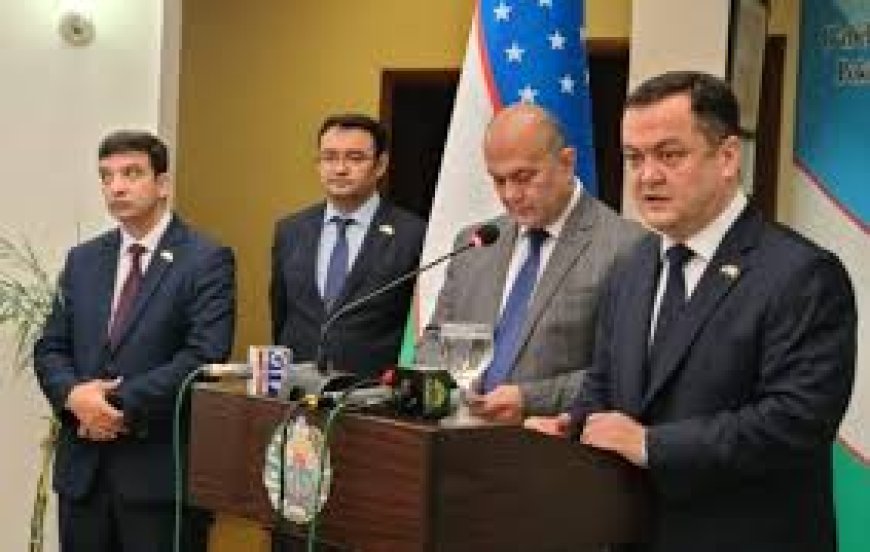Uzbekistan becomes Pakistan’s largest trading partner envoy
Uzbekistan becomes Pakistan’s top Central Asian trading partner with $253M+ trade in H1 2025. Growth driven by trade houses, flights, and cultural diplomacy.

In a significant development for regional economic cooperation, Uzbekistan has officially become Pakistan’s largest trading partner in Central Asia, according to Ambassador Alisher Tukhtaev. The statement was made during a press briefing in Islamabad, where the Uzbek envoy revealed that bilateral trade between the two countries exceeded $400 million in 2024, and has already reached $253.7 million in the first half of 2025. This represents an astonishing 123% increase compared to the same period last year—marking a new chapter in regional trade and diplomacy.
The ambassador attributed this upward trend to deepening economic ties, targeted trade exhibitions, and a shared strategic vision between the two countries. Initiatives like “Made in Uzbekistan” and “Food Fest Uzbekistan”, held in Lahore and Karachi earlier this year, generated trade agreements worth over $120 million, according to official estimates. These events not only highlighted Uzbekistan’s growing export capacity but also emphasized Pakistan’s rising demand for Central Asian goods, including textiles, dried fruits, machinery, and agricultural products.
Ambassador Tukhtaev confirmed that over 130 joint ventures are currently active between Uzbek and Pakistani entities. These span across sectors such as pharmaceuticals, food processing, logistics, construction, and digital services. He noted that both governments are working closely to simplify trade mechanisms, including setting up trade houses in Lahore and Karachi, which will serve as permanent business facilitation centers for Uzbek exporters and investors.
The envoy also highlighted progress on banking cooperation and mutual payment systems, which will ease cross-border transactions and eliminate the heavy dependence on third-country currencies. Discussions are underway to expand the Preferential Trade Agreement (PTA) to cover additional product categories, especially in textiles and processed foods. Tukhtaev emphasized that these efforts are part of a broader goal to ensure long-term, sustainable, and equitable trade relations.
Infrastructure and connectivity have also emerged as focal points of cooperation. Uzbekistan is currently in talks with Pakistan to access key seaports including Karachi and Gwadar, which would significantly shorten Uzbekistan’s trade routes to global markets. The two countries are also advancing negotiations on a trilateral transit trade agreement with Afghanistan, which would formalize land-based trade corridors and make them secure and reliable for both parties. Furthermore, plans to establish a joint transport and logistics company are being finalized, aimed at enhancing the movement of goods across borders.
Beyond economic and logistical ties, the Uzbek envoy placed strong emphasis on people-to-people connections. He highlighted the recent easing of visa policies between the two nations, encouraging business and leisure travel. The launch of direct flights between Tashkent and Lahore in April 2025, followed by Tashkent-Islamabad flights in June, is already boosting trade delegations, tourism, and academic exchanges. These flights have also made it easier for cultural delegations and entrepreneurs to travel, expanding mutual understanding and fostering goodwill.
Cultural exchanges are becoming increasingly frequent. Uzbekistan’s active participation in Nowruz festivals, Young Entrepreneurs Forums, and collaborative tourism initiatives—such as the Central Asia Tour 2025 by Pakistani bikers—demonstrates the growing warmth between the nations. Tukhtaev described this people-level engagement as essential in building trust, friendships, and long-term partnerships that go beyond economics.
As Uzbekistan positions itself as a rising economic power with vast natural resources, a strategic location, and a skilled labor force, the country is eager to welcome more Pakistani investment. The ambassador reiterated that Uzbekistan offers attractive tax incentives, a stable regulatory framework, and immense potential across manufacturing, agriculture, mining, and IT.
In his closing remarks, the envoy extended an open invitation to Pakistani businesses, investors, students, and tourists to explore opportunities in Uzbekistan. With trade numbers climbing and diplomatic relations strengthening, it is clear that both nations are entering a new era of cooperation—one that could reshape the economic landscape of the region in the years to come.
For More, visit NationBytes.pk

 Israr Ahmed
Israr Ahmed